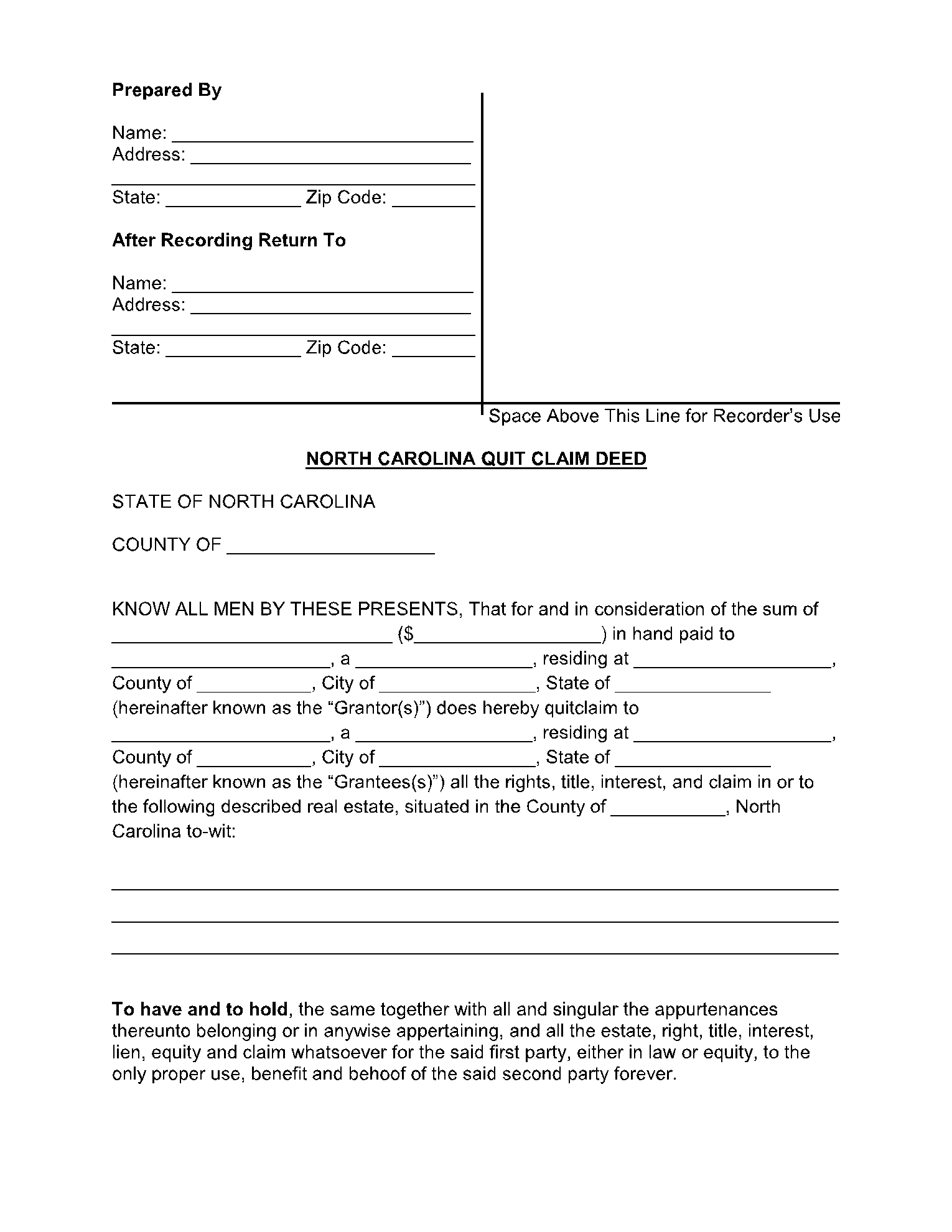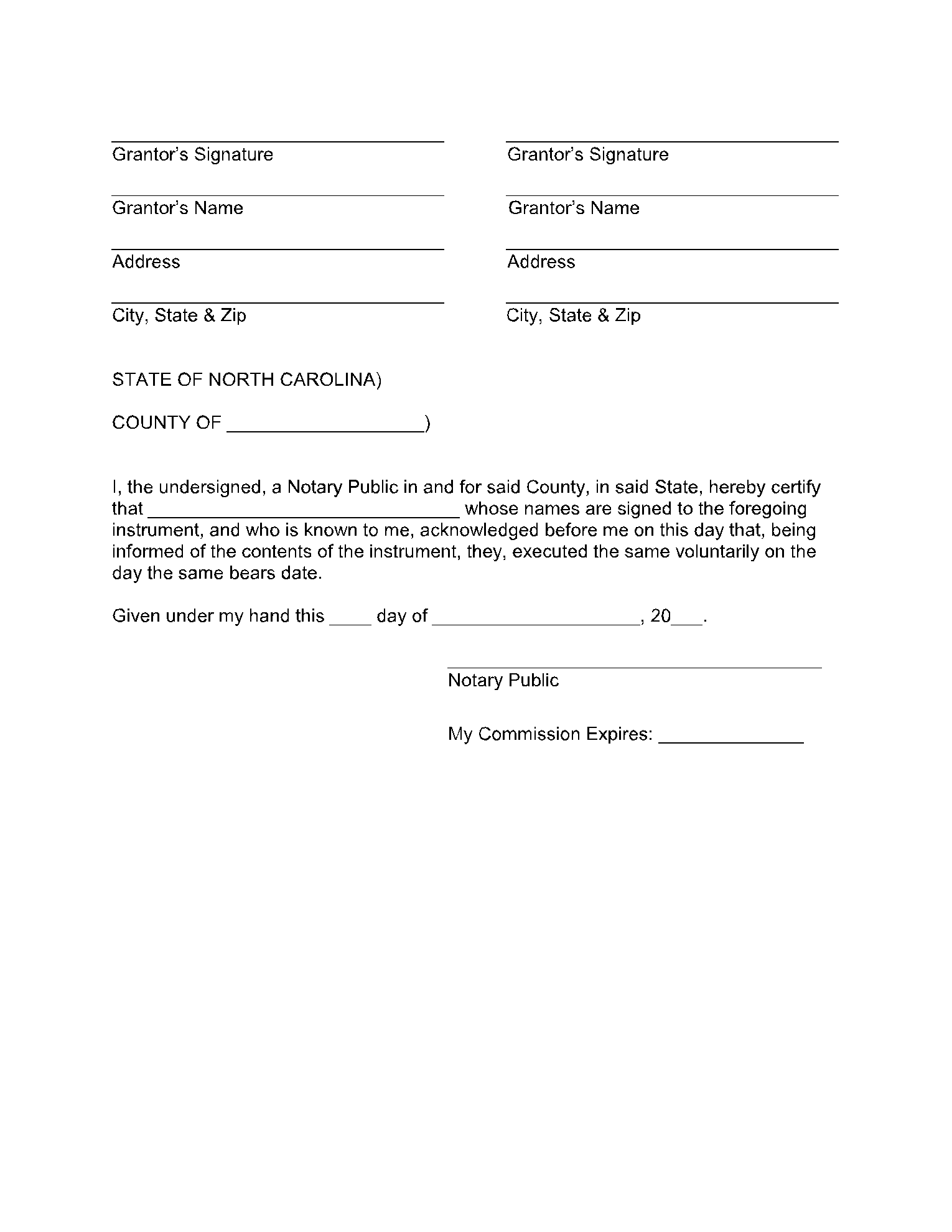Quit Claim Deed Form is necessary if you are planning to hand over your real property's rights to the other party. All such shifting of valuable and real property takes place under the legal heading of Quit Claim Deed in the written form.
Like every other state, North Carolina also encourages such a shifting of rights legally. Thus it follows its own pattern of Quit Claim Deed with a slight difference from others.
However, North Carolina Quit Claim Deed shares the same obvious purpose as other quitclaim deeds. It prevents any misconception or any mishap of the property or any loss due to ambiguity or any false claim from either party.
Generally, a North Carolina quit claim deed form should include:
-
- Executed date
- Grantor
- Grantee
- Habendum
- Consideration
- Legal description of the property
- Signatures
- Preparers
- Notary
What Is a North Carolina Quit Claim Deed?
North Carolina Quit Claim Deed helps both parties, i.e., grantor and grantee, to secure their reputation legally. It declares all the scenarios on which the grantor is giving real property ownership to the grantee. It protects both parties from financial damage in case of any illegal mishap. It defines all essential terms, conditions complying with the ownership title.
North Carolina Quit Claim Deed collects all grantor and grantee information so that it helps the relative County Recorder Office to record with authenticity. Besides this, it is essential to enter a valid address where the County office can send tax mails and other information to the expected party.
However, North Carolina Quit Claim Deed Form has no warranty. It merely means a person receiving the property right should only rely on Quit Claim Deed if a trustworthy or a close relation person is offering. Because no warranty means that title of ownership of property can vary by the grantor.
The title can vary from slight changes of right to the elimination of entire ownership. Therefore, Quit Claim Deed does not claim any guarantee of permanent ownership.
Why Do You Need a Quit Claim Deed in North Carolina?
Quit Claim Deed helps to resolve many property related issues in North Carolina. Usually, people use Quit Claim Deed to transfer the property, such as land or house, to close family members or trusted persons. It includes transferring to siblings, children, and spouses. However, it is also used in cases of divorce.
Furthermore, it is used to resolve issues such as clouds from the property title. Clouds are the faults that make your ownership risky in terms of the law. Therefore, North Carolina Quit Claim Deed helps you to mask and secure your property.
For this purpose, you can add your spouse or any other reliable relative as a compatible owner. These clouds include the issue of hidden encumbrances, liens, and related insurance issues. Additionally, this Quit Claim Deed can also help you in cases of lost heirs and wills.
Requirements for North Carolina Quit Claim Deed
There are few requirements for North Carolina Quit Claim Deed compulsory to fill to avoid rejection from the County Recorder office. It includes names, residence, and email addresses of the grantor and grantee. It is better to involve the third part as a witness and ask to mention their information and signatures.
Make sure to mention all terms and conditions under which ownership of property will be transferred. Moreover, the grantor needs to clear all dues as remaining due can weaken the Quit Claim Deed.
Furthermore, North Carolina Quit Claim Deed requires public notary that approves all parties' signature specifically of grantor under the statement of the statutory notary.
Moreover, make sure to register your North Carolina Quit Claim Deed as early as possible because it follows the numeric sequence of pages, documents, and relative books to proceed for the approval process. Also, be assured to add the address where the County office needs to return the Quit Claim Deed. Therefore, add the permanent address to avoid any mishandling.
Conclusion
North Carolina Quit Claim Deed is crucial in transferring ownership of the real property to the other entity or person. Usually, this Quit Claim Deed is used to willingly transfer rights for a gift or for resolving any property-related issue.
However, it is vital to complete the requirements for a successful Quit Claim Deed registration. These requirements include information of grantor, grantee, and witness. Plus, approval from public notary within the definition of the statutory notary is mandatory.
CocoSign imparts the latest update of North Carolina Quit Claim Deed's version. We assure you that you et the most convenient services from the CocoSign website, making all your legal affairs easier. Get your free template of North Carolina Quit Claim Deed right Now!



